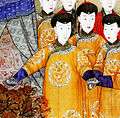Empress Xiaoyichun
| Empress Xiaoyichun | |||||
|---|---|---|---|---|---|
|
| |||||
| Empress Consort of the Qing Dynasty | |||||
| Tenure |
None (Elevated posthumously) | ||||
| Predecessor | Ulanara, the Step Empress | ||||
| Successor | Empress Xiaoshurui | ||||
| Burial |
19 November 1775 Yuling Mausoleum, Hebei, China | ||||
| Spouse | Qianlong Emperor | ||||
| Issue |
Kurun Princess Hejing Yonglu Heshuo Princess Heke Jiaqing Emperor Qianlong Emperor's 16th son Yonglin | ||||
| |||||
| Father | Wei Qingtai | ||||
| Empress Xiaoyichun | |||||||
| Chinese name | |||||||
|---|---|---|---|---|---|---|---|
| Traditional Chinese | 孝儀純皇后 | ||||||
| Simplified Chinese | 孝仪纯皇后 | ||||||
| |||||||
| Lady Weigiya | |||||||
| Chinese | 魏佳氏 | ||||||
| |||||||
| Manchu name | |||||||
| Manchu script | ᡥᡳᠶᠣᠣᡧᡠᠩᡤᠠ ᠶᠣᠩᠰᠣᠩᡤᠣ ᠶᠣᠩᡴᡳᠶᠠᡥᠠ ᡥᡡᠸᠠᠩᡥᡝᠣ | ||||||
| Romanization | hiyoošungga yongsonggo yongkiyaha hūwangheo | ||||||
Empress Xiaoyichun (23 October 1727 – 28 February 1775) was an Imperial Noble Consort of the Qianlong Emperor of the Qing Dynasty. She was also the birth mother of Qianlong's son and successor, the Jiaqing Emperor.
Biography
Empress Xiaoyichun was a Han bannerwoman by birth. Her family name was Wei (魏) and her ancestral home was in Jiangsu. Her personal name is unknown. Her father was Wei Qingtai (魏清泰), who served as interior guanling (內管領; similar to the Japanese kanrei) in the Qing imperial court. Her family name was later changed to the Manchu clan name Weigiya (魏佳) during the reign of her son, the Jiaqing Emperor, and her family was transferred from the Han Banners to the Manchu Banners.
Lady Weigiya was originally a lady-in-waiting to the Qianlong Emperor. She became Qianlong's concubine in 1745 and was granted the rank of Noble Lady Wei (魏貴人). She was granted the title of Imperial Concubine Ling (令嬪) on 9 December in the same year, and was subsequently promoted to Consort Ling (令妃) on 20 May 1749, and Noble Consort Ling (令貴妃) on 4 February 1760. On 28 July 1765 she was granted the title of Imperial Noble Consort Ling (令皇貴妃), which was second only to Empress Ulanara. Empress Ulanara died in 1766 and the Qianlong Emperor did not designate any of his consorts as the new empress. However, Lady Weigiya, who held the highest rank among all of Qianlong's concubines, was placed in charge of the imperial harem and performed the duties of an empress. She accompanied the Qianlong Emperor on his excursions to Mount Tai, Jehol and the areas south of the Yangtze River.
Lady Weigiya died on 28 February 1775 at the age of 47. On 12 March 1775 she was posthumously granted the title of Imperial Noble Consort Lingyi (令懿皇貴妃), and on 19 November she was interred in the Yuling Mausoleum in Hebei. On 9 February 1796, the Qianlong Emperor abdicated in favour of his son Yongyan (born to Lady Weigiya) and became Retired Emperor. Yongyan ascended to the throne as the Jiaqing Emperor and granted his mother the posthumous title of Empress Xiaoyichun.
Issue
Empress Xiaoyichun bore the Qianlong Emperor four sons and two daughters. Among her children include Qianlong's successor, the Jiaqing Emperor.
Empress Xiaoyichun's children were:
- Kurun Princess Hejing (固倫和靜公主; 10 August 1756 – 9 February 1775), the Qianlong Emperor's seventh daughter.
- Yonglu (永璐; 31 August 1757 – 3 May 1760), the Qianlong Emperor's 14th son.
- Heshuo Princess Heke (和碩和恪公主; 17 August 1758 – 14 December 1780), the Qianlong Emperor's ninth daughter, married Zhalantai (札蘭泰) of the Uya (烏雅) clan in September 1772.
- Yongyan (永琰; 13 November 1760 – 2 September 1820), the Qianlong Emperor's 15th son, instated in 1789 as Prince Jia of the First Rank (嘉親王), ascended to the throne on 9 February 1796 as the Jiaqing Emperor.
- Unnamed son (13 January 1763 – 6 May 1765), the Qianlong Emperor's 16th son.
- Yonglin (永璘; 17 June 1766 – 25 April 1820), the Qianlong Emperor's 17th son, instated as a beile (貝勒) in 1789, elevated to Prince Qing of the Second Rank (慶郡王) in 1799, promoted to Prince Qing of the First Rank (慶親王) in 1820.
Posthumous title
Empress Xiaoyichun's full posthumous title is:
- Empress Xiaoyigongshunkangyucirenduankeminzheyitianyushengchun
(孝儀恭順康裕慈仁端恪敏哲翼天毓聖純皇后)
Remaining portraits
-

In Daily Dress (with Prince Yongyan)
-

In Ceremonial Dress
-

In Ceremonial Dress
-
In Court Dress
-

In Court Dress
Modern references
Empress Xiaoyichun is portrayed by Zhao Lijuan (Juanzi) in the television dramas My Fair Princess (1998-1999) and by Chen Li in My Fair Princess III (2003), based on a novel series by Chiung Yao. She is referred to as Consort Ling in the dramas.
See also
References
- The Last Emperors "A Social History of Qing Imperial Institutions", Evelyn S. Rawski. ISBN 0-520-22837-5
- Daily Life in the Forbidden City, Wan Yi, Wang Shuqing, Lu Yanzhen ISBN 0-670-81164-5
- http://www.royalark.net/China/manchu9.htm, about the Aisin Gioro family tree
- http://www.guoxue.com/shibu/24shi/qingshigao/qsg_214.htm, facts about the Qing dynasty concubines. 《清史稿》卷二百十四.列傳一.后妃傳.高宗孝儀純皇后.
| Chinese royalty | ||
|---|---|---|
| Preceded by Ulanara, the Step Empress |
Empress of China (title granted posthumously) |
Succeeded by Empress Xiaoshurui |